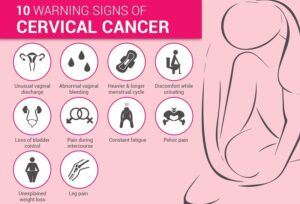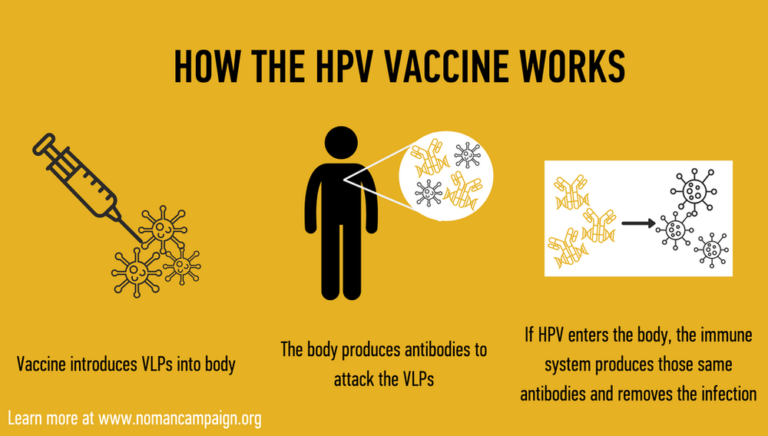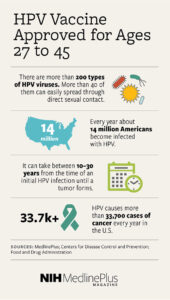Symptoms of HPV

Infection with high-risk HPV does not usually cause symptoms. The precancerous cell changes caused by a persistent HPV infection at the cervix rarely cause symptoms, which is why regular cervical cancer screening is important. Precancerous lesions at other sites in the body may cause symptoms like itching or bleeding. And if an HPV infection develops into cancer, the cancer may cause symptoms like bleeding, pain, or swollen glands.
Often, HPV warts will appear three to six months after sexual relations with an infected person; or they may take months to appear; or they may never appear. Likewise, the interval between an infection with HPV and a cervical smear abnormality can vary from months to decades.
SYMPTOMS OF CERVICAL CANCER
- Vaginal bleeding after sex.
- Vaginal bleeding after menopause.
- Vaginal bleeding between periods or periods that are heavier or longer than normal.
- Vaginal discharge that is watery and has a strong odor or that contains blood.
- Pelvic pain or pain during sex.

Prevention from HPV

You cannot fully protect yourself against HPV, but there are things that can help. Condoms can help protect you against HPV, but they do not cover all the skin around your genitals, so you’re not fully protected. The HPV vaccine protects against the types of HPV that causes most cases of genital warts and cervical cancer, as well as some other cancers, but it does not protect against all types of HPV.
HPV vaccines can be given starting at the age of 9 years. All preteens need HPV vaccination, so they are protected from HPV infections that can cause cancer later in life. Teens and young adults through age 26 years who didn’t start or finish the HPV vaccine series also need HPV vaccination.
PREVENTION FROM CERVICAL CANCER
- Get routine Pap tests. Pap tests enable doctors to detect abnormalities — changes on the cells on your cervix — and take action before cervical cancer develops.
- Follow up on abnormal Pap smears.
- Get vaccinated.
- Practice safe sex.
- Quit smoking.

Question Related to HPV Vaccination!
WHAT IS HVP VACCINE?
HPV vaccination provides strong protection against new HPV infections. Vaccination is prevention and does not cure an infection once you have it. The HPV vaccine is not used to treat HPV infections or diseases caused by HPV. HPV vaccination offers the most protection when given at ages 9-12. HPV vaccination is estimated to prevent up to 90% of HPV-related cancers.
HPV vaccination is recommended by the Centers for Disease Control and Prevention (CDC)’s Advisory Committee on Immunizations Practices (ACIP) to prevent new HPV infections and HPV-associated cancers and other diseases. The HPV vaccine Gardasil 9® protects against infection from nine HPV types: the two low-risk HPV types that cause most genital warts, plus the seven high-risk HPV types that cause most HPV-related cancers.
Study Confirms HPV Vaccine Prevents Cervical Cancer. A large study of vaccinated females showed a nearly 90% reduction in cervical cancer.

WHO SHOULD GET HPV VACCINE?
The HPV vaccine series is recommended for girls and boys, at the age of 11 or 12, and the series can be started at age 9. It is important for males as well as females to get vaccinated, because both men and women can develop cancers of the mouth and throat, anal cancers, and genital warts.
Women are also at risk for cervical cancer, and men for penile cancer. Vaccination can also reduce the spread of HPV that causes cancer to other people. Children who start the vaccine series before age 15 need two doses to be protected. For young people who weren’t vaccinated within the age recommendations, HPV vaccination is recommended up to age 26. Those who receive their first dose at age 15 or older need three doses to be protected.
CAN HPV VACCINE GIVEN TO OLDER AGES?
Yes, the vaccine can be given to adults between the ages of 27 and 45 who didn’t receive all vaccine doses earlier. Adults in this age group benefit less from the vaccine because they are more likely to have been exposed to HPV already. Therefore vaccination is not routinely recommended for people in this age group. If you are concerned that you are at risk for a new HPV infection, talk with your health care provider about whether HPV vaccination may be right for you.



